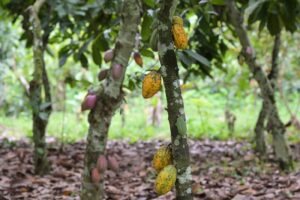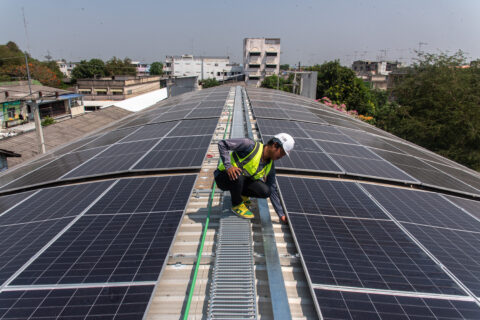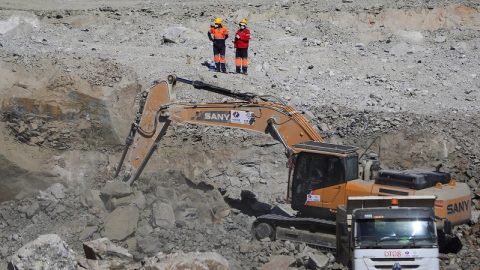A global shift towards “healthier” diets could cut non-CO2 greenhouse gas emissions, such as methane, from agriculture by 15% by 2050, according to a new report.
The EAT-Lancet Commission report on “healthy, sustainable and just food systems” says this diet would require producing more fruit, vegetables and nuts, as well as fewer livestock.
The findings build on the widely cited 2019 report from the EAT-Lancet Commission – a group of leading experts in nutrition, climate, economics, health, social sciences and agriculture from around the world.
The new report notes that one-third of all greenhouse gas emissions come from the global food system.
These emissions are so great that, even if all fossil fuels were phased out, “food can on its own push us beyond the 1.5C limit”, one of the commission co-chairs, Prof Johan Rockström, told a press briefing.
The report details a “planetary health diet” – a concept first introduced in the 2019 report – which focuses on “plant-rich” and “minimally processed” foods.
The latest edition builds on the previous report by adding improved modelling of food-system transformation and adding social-justice considerations.
The 2019 report faced a “massive online backlash” against some of its findings, particularly on cutting meat consumption, DeSmog reported earlier this year, which was “stoked by a PR firm that represents the meat and dairy sector”.
Rockström said the commission is “ready to meet that assault” if it arises again and issued concern “over this return of mis- and disinformation and denialism on climate science”.
Here, Carbon Brief picks out three key takeaways from the latest report.
- A ‘plant-rich’ diet has the best health and climate outcomes
- Transforming food systems could ‘substantially reduce’ the associated emissions
- Social justice should be a ‘central goal’ in transforming global food systems
A ‘plant-rich’ diet has the best health and climate outcomes
The new report recommends a plant-rich “planetary health diet”, which is largely the same as the one first outlined in the 2019 report.
The diet is designed to be flexible and “compatible with many foods, cultures, dietary patterns, traditions and individual preferences”, the report says.
It does not exclude meat or dairy products – the foods that cause the highest emissions – but recommends limited portions, equating to around one glass of milk per day and a couple of servings of meat and two eggs each week, for those whose diets include them.
The chart below outlines the recommended intake of different foods, adding up to around 2,400 calories each day. A range is given for each food type to accommodate different diets. The categories with the largest intakes include whole grains, plant oils, nuts and legumes.

The diet is “designed for health…[not] sustainability”, Dr Line Gordon, a commissioner on the report, told a press briefing.
But the report also analyses the climate impact of the recommendations. It estimates that shifting to the planetary diet could reduce global non-CO2 agricultural emissions – from greenhouse gases such as methane and nitrous oxide – by 15% by 2050. (See: Transforming food systems could ‘substantially reduce’ the associated emissions.)
Widespread adoption of the diet would require a two-thirds increase in fruit, vegetable and nut production and allow for a one-third reduction in livestock meat production, compared to 2020 levels.
Currently, diets across the globe all “deviate substantially” from the report’s recommendations. But the report claims that, due to the planetary diet’s health benefits, around 15 million “avoidable” deaths could be prevented each year if it were widely adopted.
The report also measures how much global food systems contribute to the nine planetary boundaries – a concept of global thresholds for a “safe and just” planet. It finds that food systems are the largest contributor to five breaches of these boundaries, which include changes in the use of land and freshwater.
In terms of steps to move towards the planetary diet, Gordon listed actions such as changing taxes to make healthy foods more affordable, clearly labelling foods and shifting agricultural production subsidies towards healthier foods.
The report highlights that “transforming food systems is not only possible, it’s essential to securing a safe, just and sustainable future for all”, Rockström says in a statement.
Transforming food systems could ‘substantially reduce’ the associated emissions
Food systems are responsible for about one-third of human-driven greenhouse gas emissions.
These emissions are roughly equally partitioned between livestock and crop production, land-use change and other aspects of the food system, including refrigeration, fertilisers, transport and retail, according to the report.
The authors use global economic models to determine how different actions towards transforming food systems could affect agricultural production, environmental impact and food prices.
For the baseline, they use a set of “business-as-usual” parameters. This scenario uses SSP2-7.0, a high-emissions pathway under which there is a global population of 9.6 billion people and global warming of 2C above pre-industrial temperatures in 2050.
Using these assumptions, the business-as-usual scenario results in a 37% increase in global agricultural production and a 33% rise in non-CO2 agricultural emissions by 2050, compared to 2020. Crop yields increase by nearly one-quarter in this scenario, while the amount of land used for agricultural cultivation expands by 2m square kilometres (km2) – an area roughly the size of Mexico.
The chart below shows the changes in non-CO2 agricultural emissions and agricultural land use under each scenario, with the three main scenarios highlighted in green. The dots indicate the results from different model runs.

The dietary transformation projection assumes a world in which there is total adherence to the suggested diet, a halving of food loss and waste and an additional 7-10% increase in global agricultural productivity.
They find that, in this scenario, agricultural emissions of non-CO2 greenhouse gases decline by 20% compared to 2020 values. Although cropland will have to expand to account for the increased intake of fruits, vegetables and legumes, the decrease in land needed for livestock-rearing means that agricultural land use will fall overall by 3.4m km2, an area the size of India.
The authors also consider a scenario that combines the dietary shifts with “ambitious mitigation” efforts. This includes policies such as carbon pricing and land-use regulations that could drive the adoption of bioenergy, afforestation and renewable energy, the report says.
Under widespread dietary shifts and ambitious mitigation, the report finds that non-CO2 emissions from agriculture will fall by 34% compared to 2020, and the reduction in agricultural land use will double compared to the scenario that only factors in the dietary shifts.
Social justice should be a ‘central goal’ in transforming global food systems
In a step further than its predecessor, the new report assesses justice in global food systems, by analysing the rights to food, a healthy environment and decent work.
The focus on social equity and justice added a “tremendous broader aspect” to the report, Dr Shakuntala Thilsted, one of the commission co-chairs, said in a briefing.
The report notes that more than half of the world’s population struggles to access healthy diets, which leads to “devastating consequences for public health, social equity and the environment”.
This primarily affects marginalised people living in low-income regions, it says.
The report finds that the diets of the world’s richest 30% of the population contribute to more than 70% of environmental pressures from food systems, such as land use and greenhouse gas emissions. The report says:
“These statistics highlight the large inequalities in the distribution of both benefits and burdens of current food systems.”
Furthermore, living and working in toxic-free environments and stable climate conditions is a “crucial” human right, it adds.
According to the report, “power asymmetries and discriminatory social and political structures” – such as the concentration of power among a small number of agribusiness firms – hinder the fulfilment of those rights.
The report says that social justice, along with environmental sustainability, should be central to global food systems.
It proposes several steps to making healthy, sustainable and just food systems more accessible by 2050: securing decent working conditions, ensuring liveable wages, recognising and protecting marginalised groups and limiting market concentration.

It notes that while taking steps to mitigate climate change will increase food costs – particularly in areas that currently do not consume adequate fruits and vegetables, and where animal-sourced food is less commonly eaten – some of these pressures can be alleviated by introducing subsidies targeted towards those preferred food groups.
Finally, the authors underscore that implementing this diet must consider both cultural context and sustainability.
However, they also warn that meeting these goals requires global action and “transformative change” in both individual and cultural habits.
The post EAT-Lancet report: Three key takeaways on climate and diet change appeared first on Carbon Brief.
EAT-Lancet report: Three key takeaways on climate and diet change
Climate Change
Colombia proposes expert group to advance talks on minerals agreement
Colombia wants countries to discuss options for a global agreement to ensure that the extraction, processing and recycling of minerals – including those needed for the clean energy transition – don’t harm the environment and human wellbeing.
The mineral-rich nation is proposing to create an expert group to “identify options for international instruments, including global and legally-binding instruments, for coordinated global action on the environmentally sound management of minerals and metals through [their] full lifecyle”.
Colombia hopes this will eventually lead to an agreement on the need for an international treaty to define mandatory rules and standards that would make mineral value chains more transparent and accountable.
The proposal was set out in a draft resolution submitted to the UN Environment Assembly (UNEA) earlier this week and seen by Climate Home News. UNEA, which is constituted of all UN member states, is the world’s top decision-making body for matters relating to the environment. The assembly’s seventh session will meet in Kenya in December to vote on countries’ proposals.
Soaring demand for the minerals used to manufacture clean energy technologies and electric vehicles, as well as in the digital, construction and defence industries have led to growing environmental destruction, human rights violations and social conflict.
Colombia argues there is an “urgent need” to strengthen global cooperation and governance to reduce the risks to people and the planet.
Options for a global minerals agreement
The proposal is among a flurry of initiatives to strength global mineral governance at a time when booming demand is putting pressure on new mining projects.
Colombia, which produces emeralds, gold, platinum and silver for exports, first proposed the idea for a binding international agreement on minerals traceability and accountability on the sidelines of the UN biodiversity talks it hosted in October 2024.
Since then, the South American nation has been quietly trying to drum up support for the idea, especially among African and European nations.
Its draft resolution to UNEA7 contains very few details, leaving it open for countries to discuss what kind of global instrument would be best suited to make mineral supply chains more transparent and sustainable.
Does the world need a global treaty on energy transition minerals?
Colombia says it wants the expert group to build on other UN initiatives, including a UN Panel on Critical Energy Transition Minerals, which set out seven principles to ensure the mining, processing and recycling of energy transition minerals are done responsibly and benefit everyone.
The group would include technical experts and representatives from international and regional conventions, major country groupings as well as relevant stakeholders.
It would examine the feasibility and effectiveness of different options for a global agreement, consider their costs and identify measures to support countries to implement what is agreed.
The resolution also calls for one or two meetings for member states to discuss the idea before the UNEA8 session planned in late 2027, when countries would decide on a way forward.
No time to lose for treaty negotiations
Colombia’s efforts to advance global talks on mineral supply chains have been welcomed by resource experts and campaigners. But not everyone agrees on the best strategy to move the discussion forward at a time when multilateralism is coming under attack.
Johanna Sydow, a resource policy expert who heads the international environmental policy division of the Heinrich-Böll Foundation, said she had hoped that the resolution would explicitly call for negotiations to begin on an international minerals treaty.
“Treaty negotiations take a long time. If you don’t even start with it now, it will take even longer. I don’t see how in two or three years it will be easier to come to an agreement,” she told Climate Home.
Despite the geopolitical challenges, “we need joint rules to prevent a huge race to the bottom for [mineral] standards”. That could start with a group of countries coming together and starting to enforce joint standards for mining, processing and recycling minerals, she said.
But any meaningful global agreement on mineral supply chains would require backing from China, the world’s largest processor of minerals, which dominates most of the supply chains. And with Colombia heading for an election in May, it will need all the support it can get to move its proposal forward.
‘Voluntary initiative won’t cut it’
Juliana Peña Niño, Colombia country manager at the Natural Resource Governance Institute, is more optimistic. “Colombia’s leadership towards fairer mineral value chains is a welcome step,” she told Climate Home News.
“At UNEA7, we need an ambitious debate that gives the proposed expert group a clear mandate to advance concrete next steps — not delay decisions — and that puts the voices of those most affected at the centre. One thing is clear: the path forward must ultimately deliver a binding instrument, as yet another voluntary initiative simply won’t cut it,” she said.
More than 50 civil society groups spanning Latin America, Africa and Europe previously described Colombia’s work on the issue as “a chance to build a new global paradigm rooted in environmental integrity, human rights, Indigenous Peoples’ rights, justice and equity”.
“As the energy transition and digitalisation drive demand for minerals, we cannot afford to repeat old extractive models built on asymmetry – we must redefine them,” they wrote in a statement.
Main image: The UN Environment Assembly is hosted in Nairobi, Kenya. (Natalia Mroz/ UN Environment)
The post Colombia proposes expert group to advance talks on minerals agreement appeared first on Climate Home News.
Colombia proposes expert group to advance talks on minerals agreement
Climate Change
California Sanctions Stark Disparities in Pesticide Exposure During Pregnancy
If you’re young, pregnant and Latina, chances are you live near agricultural fields sprayed with higher levels of brain-damaging organophosphate pesticides.
A baby in the womb has few defenses against industrial petrochemicals designed to kill.
California Sanctions Stark Disparities in Pesticide Exposure During Pregnancy
Climate Change
DeBriefed 3 October 2025: UK political gap on climate widens; Fossil-fuelled Typhoon Ragasa; ‘Overshoot’ unknowns
Welcome to Carbon Brief’s DeBriefed.
An essential guide to the week’s key developments relating to climate change.
This week
Shattered climate consensus
FRACKING BAN: UK energy secretary Ed Miliband has announced that the government will bring forward its plans to permanently ban fracking, in a move designed to counter a promise from the hard-right Reform party to restart efforts to introduce the practice, the Guardian said. In the same speech, Miliband said Reform’s plans to scrap clean-energy projects would “betray” young people and future generations, the Press Association reported.
ACT AXE?: Meanwhile, Kemi Badenoch, leader of the Conservatives, pledged to scrap the 2008 Climate Change Act if elected, Bloomberg reported. It noted that the legislation was passed with cross-party support and strengthened by the Conservatives.
‘INSANE’: Badenoch faced a backlash from senior Tory figures, including ex-prime minister Theresa May, who called her pledge a “catastrophic mistake”, said the Financial Times. The newspaper added that the Conservatives were “trailing third in opinion polls”. A wide range of climate scientists also condemned the idea, describing it as “insane”, an “insult” and a “serious regression”.
Around the world
- CLIMATE CRACKDOWN: The US Department of Energy has told employees in the Office of Energy Efficiency and Renewable Energy to avoid using the term “climate change”, according to the Guardian.
- FOREST DELAY: Plans for Brazil’s COP30 flagship initiative, the tropical forests forever fund, are “suffer[ing] delays” as officials remain split on key details, Bloomberg said.
- COP MAY BE ‘SPLIT’: Australia could “split” the hosting of the COP31 climate summit in 2026 under a potential compromise with Turkey, reported the Guardian.
- DIVINE INTERVENTION: Pope Leo XIV has criticised those who minimise the “increasingly evident” impact of global warming in his first major climate speech, BBC News reported.
€44.5 billion
The cost of extreme weather and climate change in the EU in the last four years – two-and-a-half times higher than in the decade to 2019, according to a European Environment Agency report covered by the Financial Times.
Latest climate research
- Fossil-fuelled climate change caused around 36% of Typhoon Ragasa’s direct damage to homes and properties in southern China, according to a rapid impact attribution study | Imperial Grantham Institute – Climate Change and the Environment
- Some 86% of the global population are concerned about climate change, according to a survey of 280,000 people in 142 countries and regions | Climate Policy
- A global shift towards a “planetary health diet” could slash emissions and save tens of thousands of lives each day | EAT-Lancet Commission 2025 report
(For more, see Carbon Brief’s in-depth daily summaries of the top climate news stories on Monday, Tuesday, Wednesday, Thursday and Friday.)
Captured

Clean energy has met 100% of Great Britain’s electricity demand for a record 87 hours this year so far, according to new Carbon Brief analysis. This is up from just 2.5 hours in 2021 and 64.5 hours in all of 2024. The longest stretch of time where 100% of electricity demand was met by clean energy stands at 15 hours, from midnight on 25 May 2025 through to 3pm on 26 May, according to the analysis.
Spotlight
‘Overshoot’ unknowns
As the chances of limiting global warming to 1.5C dwindle, there is increasing focus on the prospects for “overshooting” the Paris Agreement target and then bringing temperatures back down by removing CO2 from the atmosphere.
At the first-ever Overshoot Conference in Laxenburg, Austria, Carbon Brief asks experts about the key unknowns around warming “overshoot”.
Sir Prof Jim Skea
Chair of the Intergovernmental Panel on Climate Change (IPCC) and emeritus professor at Imperial College London’s Centre for Environmental Policy
So there are huge knowledge gaps around overshoot and carbon dioxide removal (CDR). As it’s very clear from the themes of this conference, we don’t altogether understand how the Earth would react in taking CO2 out of the atmosphere.
We don’t understand the nature of the irreversibilities and we don’t understand the effectiveness of CDR techniques, which might themselves be influenced by the level of global warming, plus all the equity and sustainability issues surrounding using CDR techniques.
Prof Kristie Ebi
Professor at the University of Washington’s Center for Health and the Global Environment
There are all kinds of questions about adaptation and how to approach effective adaptation. At the moment, adaptation is primarily assuming a continual increase in global mean surface temperature. If there is going to be a peak – and of course, we don’t know what that peak is – then how do you start planning? Do you change your planning?
There are places, for instance when thinking about hard infrastructure, [where overshoot] may result in a change in your plan – because as you come down the backside, maybe the need would be less. For example, when building a bridge taller. And when implementing early warning systems, how do you take into account that there will be a peak and ultimately a decline? There is almost no work in that. I would say that’s one of the critical unknowns.
Dr James Fletcher
Former minister for public service, sustainable development, energy, science and technology for Saint Lucia and negotiator at COP21 in Paris.
The key unknown is where we’re going to land. At what point will we peak [temperatures] before we start going down and how long will we stay in that overshoot period? That is a scary thing. Yes, there will be overshoot, but at what point will that overshoot peak? Are we peaking at 1.6C, 1.7C, 2.1C?
All of these are scary scenarios for small island developing states – anything above 1.5C is scary. Every fraction of a degree matters to us. Where we peak is very important and how long we stay in this overshoot period is equally important. That’s when you start getting into very serious, irreversible impacts and tipping points.
Prof Oliver Geden
Senior fellow and head of the climate policy and politics research cluster at the German Institute for International and Security Affairs and vice-chair of IPCC Working Group III
[A key unknown] is whether countries are really willing to commit to net-negative trajectories. We are assuming, in science, global pathways going net-negative, with hardly any country saying they want to go there. So maybe it is just an academic thought experiment. So we don’t know yet if [overshoot] is even relevant. It is relevant in the sense that if we do, [the] 1.5C [target] stays on the table. But I think the next phase needs to be that countries – or the UNFCCC as a whole – needs to decide what they want to do.
Prof Lavanya Rajamani
Professor of international environmental law at the University of Oxford
I think there are several scientific unknowns, but I would like to focus on the governance unknowns with respect to overshoot. To me, a key governance unknown is the extent to which our current legal and regulatory architecture – across levels of governance, so domestic, regional and international – will actually be responsive to the needs of an overshoot world and the consequences of actually not having regulatory and governance architectures in place to address overshoot.
Watch, read, listen
FUTURE GAZING: The Financial Times examined a “future where China wins the green race”.
‘JUNK CREDITS’: Climate Home News reported on a “forest carbon megaproject” in Zimbabwe that has allegedly “generated millions of junk credits”.
‘SINK OR SWIM’: An extract from a new book on how the world needs to adapt to climate change, by Dr Susannah Fisher, featured in Backchannel.
Coming up
- 7 October: International Energy Agency (IEA) renewables 2025 report launch
- 8-10 October: World summit of Indigenous peoples and nature, Abu Dhabi, UAE
- 9-15 October: International Union for the Conservation of Nature (IUCN) 2025 congress, Abu Dhabi, UAE
Pick of the jobs
- UK government foreign, commonwealth and development office, senior climate policy adviser | Salary: CA$93,207. Location: Calgary, Canada
- Wellcome Trust, senior research manager, climate and health | Salary: £64,800. Location: London
- Bloomberg, product manager – climate, nature and sustainability regulations | Salary: Unknown. Location: London
DeBriefed is edited by Daisy Dunne. Please send any tips or feedback to debriefed@carbonbrief.org.
This is an online version of Carbon Brief’s weekly DeBriefed email newsletter. Subscribe for free here.
The post DeBriefed 3 October 2025: UK political gap on climate widens; Fossil-fuelled Typhoon Ragasa; ‘Overshoot’ unknowns appeared first on Carbon Brief.
-
Climate Change2 years ago
Spanish-language misinformation on renewable energy spreads online, report shows
-
Climate Change Videos2 years ago
The toxic gas flares fuelling Nigeria’s climate change – BBC News
-
Climate Change2 months ago
Guest post: Why China is still building new coal – and when it might stop
-

 Greenhouse Gases1 year ago
Greenhouse Gases1 year ago嘉宾来稿:满足中国增长的用电需求 光伏加储能“比新建煤电更实惠”
-

 Climate Change1 year ago
Climate Change1 year ago嘉宾来稿:满足中国增长的用电需求 光伏加储能“比新建煤电更实惠”
-
Greenhouse Gases2 months ago
Guest post: Why China is still building new coal – and when it might stop
-

 Carbon Footprint1 year ago
Carbon Footprint1 year agoUS SEC’s Climate Disclosure Rules Spur Renewed Interest in Carbon Credits
-
Renewable Energy3 months ago
US Grid Strain, Possible Allete Sale















